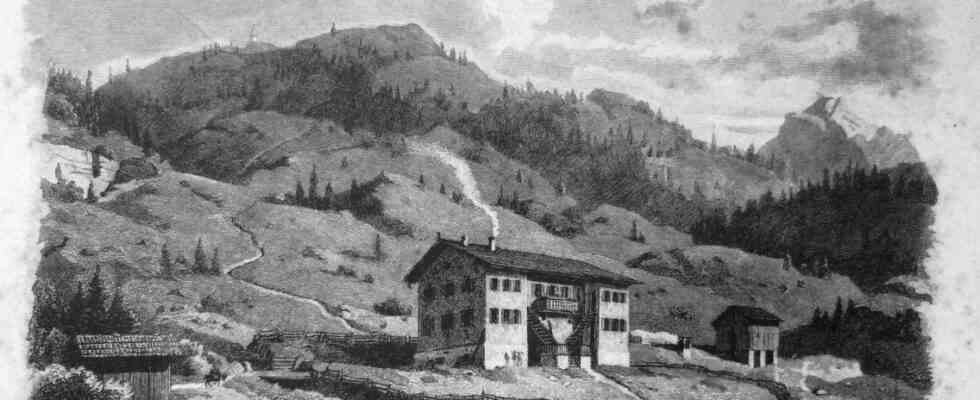A historical inventory lists 400 beer bottles, 600 wine bottles of different sizes and 200 bottles of champagne, among other things, as drinks that were stored when the Grüntenhaus opened. In 1854, Carl Hirnbein opened the first mountain hotel in the Allgäu mountains on the Grünten. The “Alpkönig” they still call Hirnbein in the region, he was not only a pioneer in tourism, today the most important branch of the economy in southern Swabia. The guests should get something decent to drink, but they should also be comfortable in other ways, according to a commemorative publication marking the 150th anniversary. Tourists were given a whey cure on request, and they were allowed to ride up to the mountain hut just below the summit on a well-developed path.
There is not much left of this path today, which is increasingly causing problems for the descendants of Hirnbein: The Grüntenhaus, says great-great-great-grandson Werner Kollmann, needs to be completely renovated, the leaseholders of the hut and alp needed a proper road, in order to continue operating the business. “Today this is one of the worst hiking trails in the Allgäu, which is more like a stream bed,” says Kollmann. Conservationists are less enthusiastic about the plans, they warn of trees to be felled and unjustified interventions in nature. The municipality of Burgberg has now voted in a narrow vote for the expansion of the path – the district office will decide in the end.
Kollmann emphasizes that nobody wants to put up a wellness hotel up there. On the Grünten, which is also known as the “Guardian of the Allgäu” due to its exposed location, a dispute has been raging for years about the Grüntenhütte, which should not be confused with the Grüntenhaus, and plans by an investor family to expand this mountain economy with new cable cars and a tourist attraction. The project, which provoked great resistance in the Allgäu, has meanwhile become silent. “We don’t intend the Grüntenhaus to become a large income object,” says Kollmann. However, it has not been extensively repaired since the 1950s. “For us it is a family obligation to preserve the house.”
On a trip to Switzerland, his ancestor Hirnbein stayed on the Rigi mountain range, where he had a choice of several inns. He also wanted something like this in his Allgäu homeland, which at the time was still an undeveloped area for tourism. In general, Hirnbein is considered a revolutionary in the Allgäu, he made a decisive contribution to establishing a strong dairy industry in what was then a poor region. The construction of the inn on the Grünten took 13 months, and Hirnbein even had a small hotel shop set up with literature about the Allgäu and steel engravings from the Grünten. In addition to leaflets, the businessman advertised his tourist attraction in newspapers – even in the Magdeburg general gazettei.e. far beyond Bavaria.
Tenants have to be found next year
Kollmann believes that such a historic building must be preserved. There is a cable car directly to the summit, where there is a Bavarian Radio transmission mast. However, building material cannot easily be transported from there to the Grüntenhaus. Building your own cable car would be significantly more expensive than expanding the hiking trail, transport flights with a helicopter would also not be expedient to transport heavy material and also because of the costs. From Kollmann’s point of view, the only thing that remains is an expansion of the two-kilometer path, which is also indispensable for the alp that belongs to the house. Kollmann has to find new tenants next year. It is difficult to mobilize farmers who are still driving cattle, applicants want to be able to drive up and down in a car. “They also have to go down to the town quickly to look after their children.”
Many years ago, the Kollmann family tried to expand the path. The resistance was great. “Then we just let it go,” says Kollmann. “Now we have to do something.” He does not want to do anything that cannot be approved, but now he wants to initiate the next steps. “The cuts will be checked by the district office. I don’t think they will be dramatic.”

